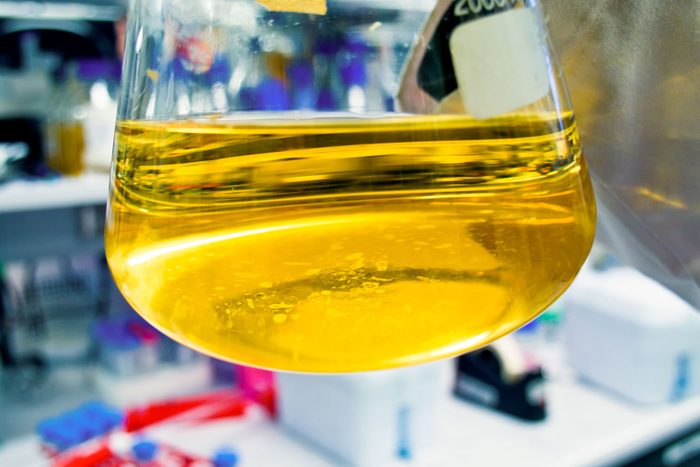
Common causes of particles in urine
If you’ve ever had to provide a sample for a urinalysis or other kind of “pee test,” sometimes that up-close-and-personal look at your urine reminds you there’s a lot about your body’s everyday functions that you don’t even know are happening.
Just like analyzing your stool is recommended for spotting signs of internal conditions such as colon cancer, observing your urine can provide valuable health clues. Urologists, the expert doctors in urinary health, stress that the presence of particles in urine can range from minor issues, like dehydration, to more serious ones that demand immediate attention, such as infections. The stage of your menstrual cycle can also influence the presence of these particles.
Here are a few common causes behind those white flakes in urine that may yield a cloudy, milky, or even snow globe-like appearance, or what it means when you notice a white stringy substance when you go “number one.”
10 Things Your Pee Reveals About Your Health (Besides Dehydration)
Is it normal to have debris in your urine?
Encountering particles in urine is not always a cause for concern. Since peeing is the body’s natural way of eliminating waste, it’s normal to notice debris occasionally. However, if these particles are accompanied by symptoms like pain or burning during urination, frequent urination, blood in the urine, lower back or abdominal pain, or fever and chills, it’s a sign that something might be wrong, and a medical check-up is warranted.
Ahead, urologists and researchers will explain what could be causing these changes in your urine and when it might be time to seek medical advice for peace of mind and health.
This Urine Color Chart Reveals Exactly What Your Pee Color Means

Causes of particles in urine
1. Dehydration
When the body lacks sufficient water, urine becomes more concentrated with salts, minerals, and other substances, which can precipitate out as visible particles. Increasing water intake usually resolves the issue, making the urine more transparent.
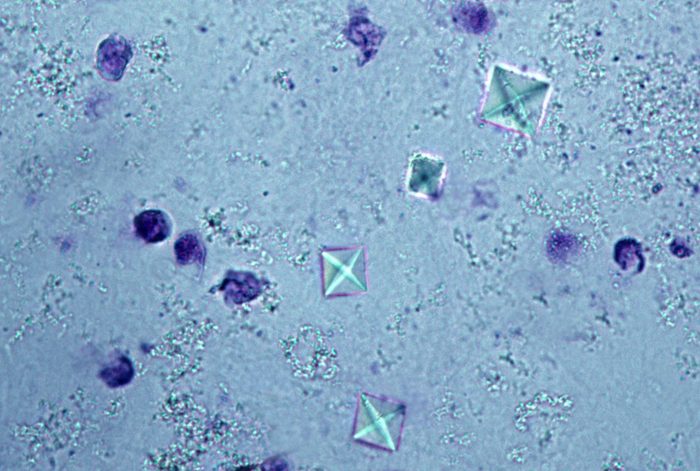
2. Kidney stones
Kidney stones can cause white particles in the urine when they start to break down and move into the urinary tract. These hard mineral and salt deposits can form in the kidneys and may not cause symptoms until they move.
The process can lead to pain, blood in the urine (hematuria), and cloudy urine. Drinking fluids helps pass the stones, though some cases may require medical intervention.

3. Sexually transmitted infections (STIs)
Sexually transmitted infections, such as chlamydia and gonorrhea, can lead to the presence of white particles in urine due to discharge or pus entering the urinary tract.
These infections often present with additional symptoms, including pain during urination, discharge from the genitals, and discomfort in the pelvic area, as pointed out by the Cleveland Clinic. Early detection and treatment with antibiotics are vital to prevent long-term health issues.

4. Urinary Tract Infections
According to a 2023 study, urinary tract infections are among the most common causes of particles in urine. These infections occur when bacteria enter the urinary system, causing inflammation and the production of pus.
UTI symptoms often include a burning sensation during urination, frequent urges to urinate, and cloudy or strong-smelling urine. Prompt antibiotic treatment is crucial to prevent the infection from spreading to the kidneys.
Here’s Why Pee Smells the Way It Does, According to a Urology and Kidney Doctor
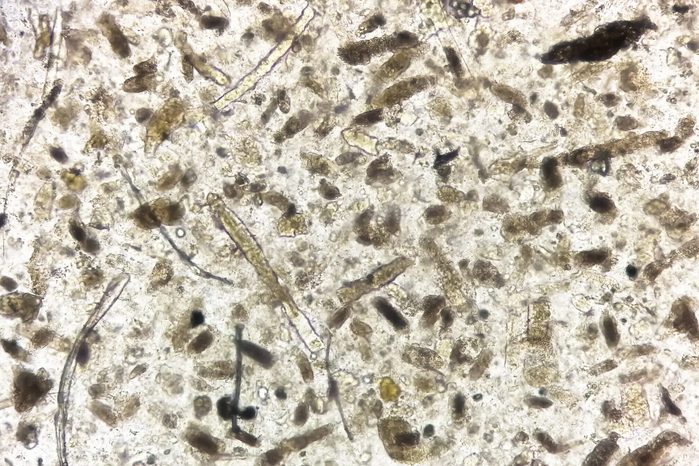
5. Proteinuria
In a 2023 review, internal medicine and nephrology experts discuss proteinuria, which is marked by increased protein levels in the urine and can manifest as white particles or a foamy texture, typically detected through urine testing.
This condition can suggest problems with kidney function ranging from temporary stress, such as from high blood pressure, to more chronic conditions like diabetes and kidney disease.

6. Pregnancy
During pregnancy (and around the time of ovulation), hormonal changes can cause changes in urine due to increased vaginal discharge, which is normal during these periods. However, it’s essential for pregnant women to monitor these changes closely and consult with their healthcare provider to rule out infections.
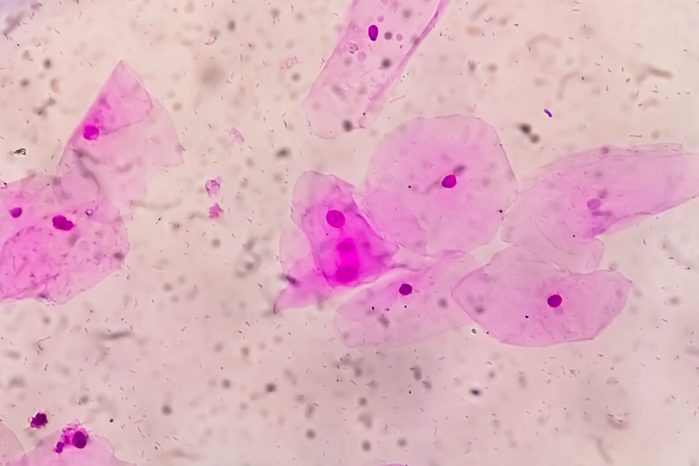
7. Vaginal infections
Infections such as bacterial vaginosis and yeast infections can lead to changes in urine when vaginal discharge becomes mixed with urine. These conditions create an imbalance in the normal vaginal flora, leading to symptoms like itching, burning, and unusual discharge that can appear like cottage cheese, according to a physician with the American College of Obstetricians and Gynecologists (ACOG). Effective treatment typically involves medication to restore the balance of vaginal bacteria or antifungal therapies for yeast infections.

8. Prostatitis
Inflammation of the prostate gland can cause white particles in urine due to the presence of pus or prostatic fluid. Symptoms may include difficulty urinating, pain in the groin, pelvic area, or genitals, and sometimes fever. Treatment options vary based on the cause, ranging from antibiotics for bacterial prostatitis to other medications and therapies for chronic cases.
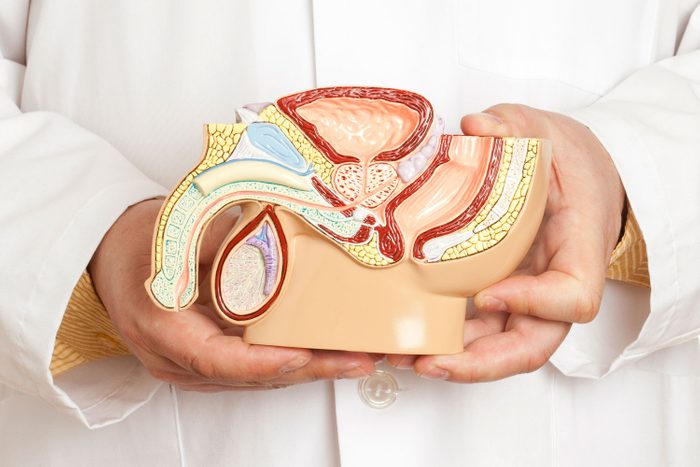
9. Retrograde ejaculation
Retrograde ejaculation occurs when semen enters the bladder instead of exiting through the penis during ejaculation, which can cause white particles to appear in urine.
This condition is often related to diabetes, spinal injuries, or the use of certain medications. According to the Cleveland Clinic, retrograde ejaculation is not harmful, but it can affect fertility and may require treatment if conception is desired.
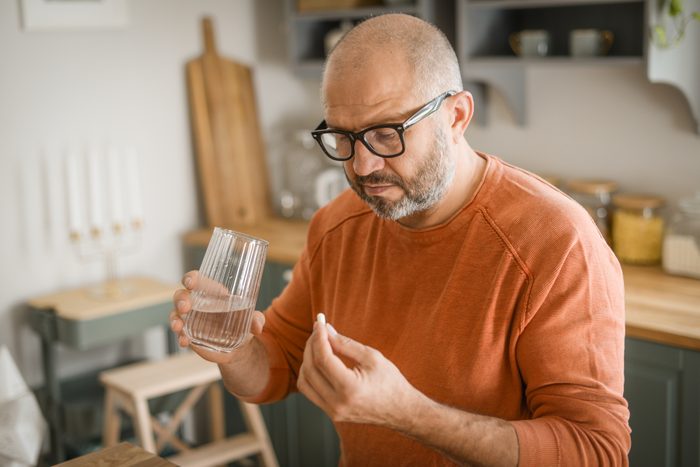
10. Medications and supplements
Certain medications like antibiotics, diuretics, and antacids can crystallize or precipitate in the urine, especially if they are not fully dissolved or if the body is dehydrated. Always consult a healthcare provider if changes in urine appear after starting something new to ensure they are not causing adverse effects.

When to see a doctor about particles in urine
If you observe ongoing white particles, changes in the color of your urine, or experience symptoms like pain or discomfort, it’s crucial to consult a licensed healthcare provider. They can perform diagnostic procedures, such as urinalysis and imaging studies, to determine if there is an underlying health issue.
For more wellness updates, subscribe to The Healthy by Reader’s Digest newsletter and follow The Healthy on Facebook and Instagram. Keep reading:
- ‘Here’s How I Knew I Had Bladder Cancer’: One Patient’s Story After Learning the Most Common Symptom
- Best Way to Keep Weight Off? Walk This Many Steps, Says New Study
- New Study: Drinking This Daily May Increase “Forever Chemicals” In Your Blood
- Dick Vitale Reveals What’s Given Him Strength Through 3 Cancer Battles
